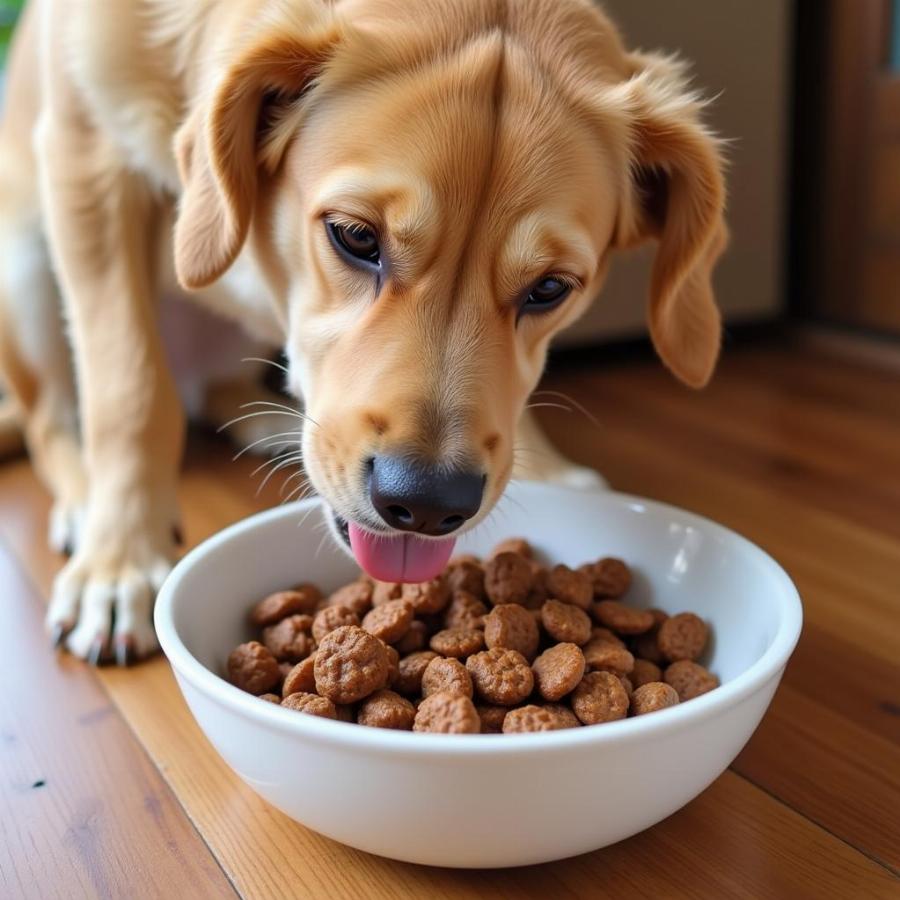Dog loud stomach noises, also known as borborygmi, are a common occurrence in our canine companions. While these rumbling sounds can sometimes be concerning, they are often a normal part of the digestive process. Understanding the causes of these noises, when they might indicate a problem, and how to address them can help you ensure your furry friend’s well-being. This comprehensive guide will delve into the reasons behind your dog’s loud stomach noises and offer practical advice on how to manage them.
Why is My Dog’s Stomach Making Loud Noises?
Several factors can contribute to dog loud stomach noises. These range from normal digestive processes to more serious underlying health conditions. One of the most common reasons is simply hunger. Just like us, a dog’s stomach can rumble when it’s empty, signaling its need for food. This is often accompanied by other behaviors like pacing, whining, or staring intently at their food bowl. Another common cause is gas. As food is digested, gases are produced, leading to gurgling and rumbling sounds. This is usually nothing to worry about, especially if your dog is otherwise acting normally.
However, dog loud stomach noises can also be a sign of something more serious. Inflammatory bowel disease (IBD), intestinal parasites, or even dietary indiscretion (eating something they shouldn’t have) can cause inflammation and irritation in the digestive tract, leading to increased gas production and louder than usual stomach noises.
Dog Stomach Gurgling Loudly: When Should I Be Concerned?
While occasional dog stomach gurgling loudly is usually nothing to worry about, there are instances when it warrants a visit to the veterinarian. If the loud stomach noises are accompanied by other symptoms such as vomiting, diarrhea, loss of appetite, lethargy, or weight loss, it’s crucial to seek professional advice. These additional symptoms could indicate a more serious underlying condition requiring prompt veterinary attention.
Home Remedies for Dog Loud Stomach Noises
If your dog’s stomach is making loud noises but they are otherwise acting normal, there are a few things you can try at home to help alleviate the issue. Ensuring your dog has access to fresh water is essential for proper digestion. A bland diet of boiled chicken and rice can be helpful if your dog is experiencing digestive upset. Adding a probiotic supplement to their food can also help restore the balance of good bacteria in their gut. However, if the noises persist or worsen, it’s always best to consult with your veterinarian.
Dog Stomach Noises and Dietary Changes
Sometimes, a simple change in diet can make a world of difference. If your dog’s stomach making loud noises and vomiting or experiencing other digestive issues, switching to a high-quality, easily digestible food can be beneficial. Be sure to introduce any new food gradually to avoid further upsetting your dog’s stomach.
 Dog eating sensitive stomach food
Dog eating sensitive stomach food
Could it be something more serious?
While often benign, persistent and loud stomach noises could signal more serious conditions like dog stomach gurgling loudly, or even blockage. It’s important to monitor your dog for any changes in behavior or other symptoms.
What if my dog poops while sleeping? Is this related?
While seemingly unrelated, changes in bowel movements can sometimes accompany digestive issues. Always consult with your veterinarian if you notice anything unusual.
Conclusion
Dog loud stomach noises can be concerning, but they are often a normal part of digestion. Understanding the various causes, recognizing when to seek veterinary care, and implementing some simple home remedies can help ensure your furry friend’s digestive health. By staying attentive to your dog’s behavior and seeking professional advice when necessary, you can help keep their tummy happy and healthy. Remember, if your dog’s stomach gurgling loud and they are showing other symptoms like vomiting or diarrhea, it’s crucial to consult your veterinarian. If your my dog has soft stool but is acting fine, it still warrants a check-up.
FAQ
- Are dog loud stomach noises always a cause for concern? No, not always. Often, they are simply a sign of hunger or gas.
- When should I take my dog to the vet for loud stomach noises? If the noises are accompanied by other symptoms like vomiting, diarrhea, or lethargy.
- What can I feed my dog to help with loud stomach noises? A bland diet of boiled chicken and rice can be soothing.
- Can stress cause loud stomach noises in dogs? Yes, stress can sometimes affect a dog’s digestive system.
- Are there any over-the-counter medications for dog loud stomach noises? It’s best to consult your vet before giving your dog any medication.
- Can probiotics help with dog loud stomach noises? Probiotics can help restore the balance of good bacteria in the gut and may help reduce gas and digestive upset.
- What are some common causes of dog loud stomach noises? Hunger, gas, dietary indiscretion, and intestinal parasites are some common causes.